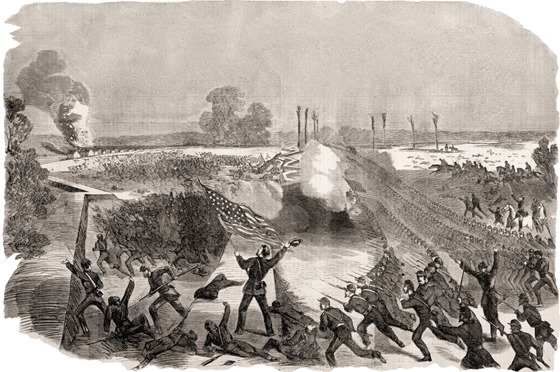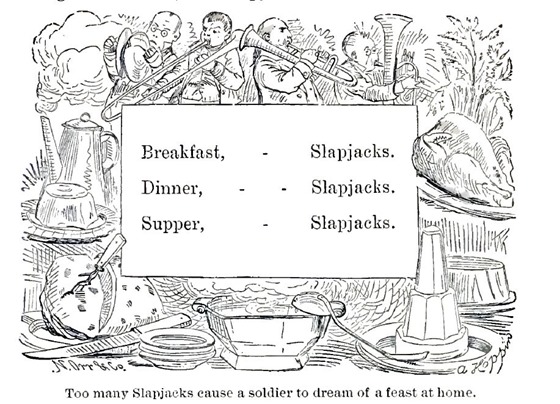May 17. — Major Whittier came over here this morning, and told me a few things in regard to Brigadier General —. The major was on his way to Washington. I saw General Benham during the morning, and told him that I should like to leave him, on account of what had occurred between us in regard to the night of laying the bridges. We had a short conversation, and I told him that I should like to resign my place as A. D. C., to take effect on the 19th. I then went over to headquarters, where I saw General Reynolds, and told him everything that had happened in regard to this affair. He told me that I had done right, and in reply to my question as to whether he would be willing to have me as an acting aide, said that he would. About 5 in the afternoon we had a severe wind, followed by a heavy shower.
Friday, May 17, 2013
May 17—Up to to-day nothing. But this morning at 4 we were ordered to cook up all our rations, and be ready to march in one hour. We left Kinston by rail at 12 M. Got to Goldsboro at 3, went through to Weldon, left here at 5 P.M., and got to Petersburg, Va., on the morning of the 18th; left there at -6 P.M. Katz and myself went uptown—ate two suppers. Had a very good time while in town. We camped all night on Dunn’s Hill.
The Battle of Black River Bridge, May 17, 1863 – Sketched by Mr. Theodore R. Davis.
__________
The Fight at the Black River Bridge.
“Head-Quarters Of Major-General McPherson,
Commanding 17th Corps Army Tennessee,
Camp Near Vicksburg, May 18, 1863.
“We had fought the battle of Champion’s Hill, and at night lain down as tired as mortals ever are; yet the next day, finding the enemy, we, before dinner, captured his works, seventeen guns, and over two thousand prisoners.
“The brigade of Colonel Lawler was ordered to advance upon the right, and the division of General A. J. Smith upon the left, which they did, as illustrated by my sketch.”
Mr. Theodore R. Davis, Published
in Harper’s Weekly, June 20, 1863.
MAY 17TH.—On the road to Vicksburg, resolved to capture the city or get badly whipped. We have not known defeat since we left Fort Donelson, and we propose to keep our good record up. We have seen hard times on some hotly contested fields, but mean to have nothing but victory, if possible, on our banner.
The advance of our army has made a grand sweep, pell-mell, over the rebel works at Big Black River, routing the foe and capturing twenty-five hundred prisoners with twenty-nine cannon. Their rifle pits were quite numerous, but they were all on low ground, so that when the word was given the Yankees rushed over them with the greatest ease. The rebs may be drawing us into a trap, but as yet we have not a moments’ fear of the result, for when Grant tells us to go over a thing we go, and feel safe in going. Even in time of peace we would not wish the great curtain that hides the future to be rolled away, nor do soldiers now ask to know what lies before them. But every day brings new scenes fraught with dangers, hair-breadth escapes or death, after which the ranks close and move on undaunted. And our love of country still grows as we go.
We camped within a few miles of Black River, perfectly satisfied, though we have had no hand in the slaughter to-day. We rather expected to be halted a few days at the river, where the enemy would surely be strongly fortified, and where, as they could certainly spare the greater part of their forces from Vicksburg, if they would but bring them out, they could make a desperate stand. We are now fighting hard for our grub, since we have nothing left but flour, and slapjacks lie too heavy on a soldier’s stomach. But there is great consolation in reflecting that behind us Uncle Sam keeps piled a bountiful supply all ready to be issued as soon as we can find a proper halting place.
May 17th. Commences with calm, warm weather; at ten A. M. inspected ship and crew; and at ten thirty A. M. called all hands to muster, and performed Divine service on the quarter-deck; at four thirty P. M. the Albatross came down the Mississippi with a coal barge in tow, and anchored ahead of us. She had been up to Grand Gulf. The Sachem got under way and went up Red river. Light breezes from the northward and westward.
 May 17th, 1863.—Hardly was our scanty breakfast over this morning when a hurried ring drew us both to the door. Mr. J., one of H.’s assistants, stood there in high excitement.
May 17th, 1863.—Hardly was our scanty breakfast over this morning when a hurried ring drew us both to the door. Mr. J., one of H.’s assistants, stood there in high excitement.
“Well, Mr. L., they are upon us; the Yankees will be here by this evening.”
“What do you mean?”
“That Pemberton has been whipped at Baker’s Creek and Big Black, and his army are running back here as fast as they can come and the Yanks after them, in such numbers nothing can stop them. Hasn’t Pemberton acted like a fool?”
“He may not be the only one to blame,” replied H.
“They’re coming along the Big B. road, and my folks went down there to be safe, you know; now they’re right in it. I hear you can’t see the armies for the dust; never was anything else known like it. But I must go and try to bring my folks back here.”
What struck us both was the absence of that concern to be expected, and a sort of relief or suppressed pleasure. After twelve some worn-out-looking men sat down under the window.
“What is the news?” I inquired.
“Retreat, retreat!” they said, in broken English—they were Louisiana Acadians.
About 3 o’clock the rush began. I shall never forget that woful sight of a beaten, demoralized army that came rushing back,—humanity in the last throes of endurance. Wan, hollow-eyed, ragged, footsore, bloody, the men limped along unarmed, but followed by siege-guns, ambulances, gun-carriages, and wagons in aimless confusion. At twilight two or three bands on the court-house hill and other points began playing Dixie, Bonnie Blue Flag, and so on, and drums began to beat all about; I suppose they were rallying the scattered army.
![]()
______
Note: To protect Mrs. Miller’s job as a teacher in New Orleans, the diary was published anonymously, edited by G. W. Cable, names were changed and initials were often used instead of full names — and even the initials differed from the real person’s initials.by John Beauchamp Jones
MAY 17TH.—The last few days have been cool and dry; fine weather for campaigning. And yet we hear of no demonstrations apparently, though I believe Lee’s army is moving.
Mr. Lamar, of Savannah (formerly president of the Bank of the Republic, New York), writes that he and others are organizing an Exporting and Importing Company, and desires the government to take an interest in it. So far the heads of bureaus decline, and of course the Secretary will do nothing. But the Secretary has already engaged with Mr. Crenshaw in a similar enterprise, and so informed Mr. Mason, at London.
About 10 A.M., some 2500 men of all arms arrived at “double quick,” having left Ashland, eighteen miles distant, at 5 o’clock this morning. That was brisk marching. The guns were sent down on the railroad. The government has information that Gen. Keyes, with a full division of infantry and a brigade of cavalry, had marched up to West Point, to threaten Richmond. The troops, however, which arrived from Ashland, had been taken from the batteries here, and did not belong to Gen. Lee’s army.
Messrs. Davenport & Co., Mobile, charge Gen. Buckner with permitting 1000 bales of cotton to be shipped to New Orleans.
The president of the Fredericksburg Road states, in a letter to the Secretary, that, after the battle, by military authority, the cars were appropriated by the Federal officers (prisoners), while our wounded soldiers had to remain and await the return of the trains.
Hon. Mr. Dargin, of Alabama, writes to the Secretary, to procure from the President a disavowal of the “organship” of the Enquirer, as that paper, under the belief that it speaks for the government, is likely to inflict much mischief on the country. He alluded to the bitter articles against the Democrats and peace men of the North, who would soon have been able to embarrass, if not to check the operations of the Republican war party. He says now, that they will write against us, and deal destruction wherever they penetrate the land.
—At daylight this morning the National army, under General Grant, moved on from Champion Hill to the Big Black River, Miss., where a battle was fought with the rebels, under Pemberton, and they were again defeated and driven into their intrenchments around Vicksburgh with great loss of men and munitions of war.—(Doc. 193.)
—Jackson, Miss., was evacuated by the National forces, belonging to the army of General Grant.
—The schooner Isabel, attempting to run the blockade at Mobile, was run ashore close under the walls of Fort Morgan, and Master’s Mate Dyer, of the R. R. Cuyler, was sent with boats, either to bring her off or burn her. They were just in time to capture sixteen men, being her crew and some passengers. Finding it impossible to get the schooner off, he set fire to her and then pulled for his own ship. By this time the alarm had been given and the rebels in the fort were on the alert Mr. Dyer, finding that the schooner did not break out in a blaze, as he expected, turned back toward the fort, and effectually did his work. — The rebel schooner Ripple, was captured by the National gunboat Kanawha, blockading the port of Pensacola, Fla.—Rebel guerrillas visited Burning Springs, Wirt County, Va., where they burned oil-works and committed other depredations.
—Yesterday a company of the First New-York cavalry having been captured at Charlestown, Va., by a gang of guerrillas, under the leadership of Captain Mosby, the regiment left Berrysville today, under the command of Major Adams, in pursuit of the rebels. They were overtaken at Berry’s Ford, on the Rappahannock, and, after a brief skirmish, the rebels were completely routed and the prisoners recaptured.









